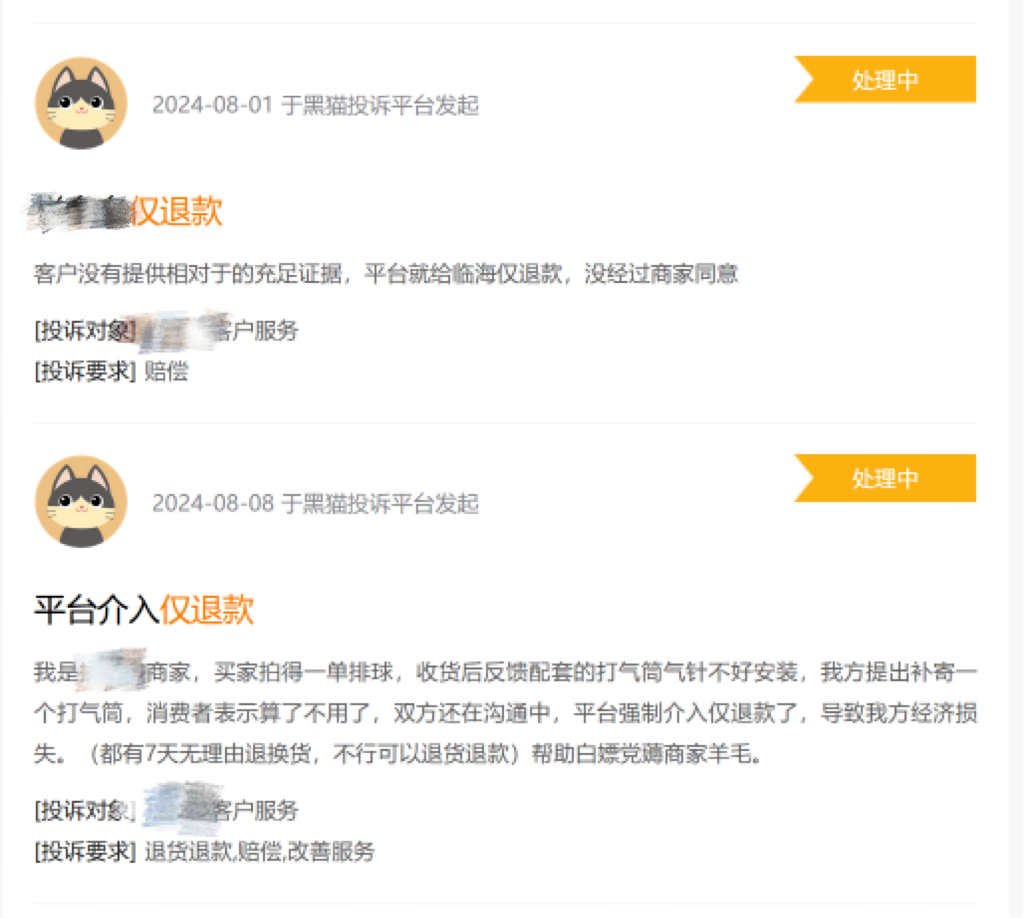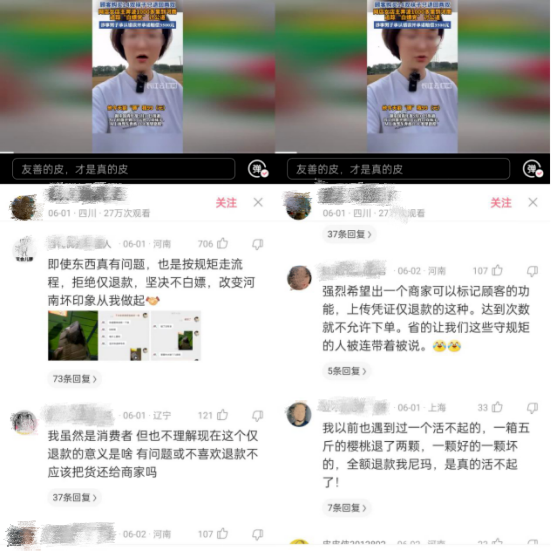How does AI balance the rights and interests of users and merchants, from shipping insurance to mere refunds?
![]() 08/19 2024
08/19 2024
![]() 577
577
The most lively event in the e-commerce industry this year has been the issue of "mere refunds", with both sides having their own arguments. On one hand, merchants have driven over 1,000 kilometers to find buyers and protect their rights over 12 pairs of socks that were refunded unfairly. On the other hand, users who bought counterfeit goods spent 30 days before being able to appeal for compensation.
When "mere refunds" become a means of "wool-pulling" or "buying for free", deviating from their original intention, platforms, as intermediaries between users and merchants, cannot remain inactive.
In fact, whether it's e-commerce, food delivery, or OTA, platform enterprises involving the rights and interests of three parties need to find a balance. To achieve this, not only does the upper-level strategic concept need to be scientifically designed, but also the specific rules and technologies implemented must be more targeted.
As for "mere refunds", this service option, which was proposed over a decade ago, has proven its feasibility through years of market validation. However, as the market environment changes, the relevant technical service terms should also evolve dynamically.
After Alibaba introduced new rules for mere refunds on August 9, the platform's intervention in the scenario of "received goods but requesting a mere refund" decreased by 20% within the first week, with a sharp drop in unreasonable mere refund requests. A new form of mere refunds is bringing a fairer business landscape for e-commerce merchants, especially small and medium-sized ones.
01
The Other Side of Mere Refunds
Initially, "mere refunds" were introduced after "7-day no-reason returns" and "shipping insurance" as another tilt in online shopping rules to enhance consumer rights. Offering consumers the right to mere refunds under certain conditions meant they no longer had to worry about the hassle of returning goods online, which also encouraged merchants to improve product quality and service awareness.
This also included platforms' expectations of increasing order volumes by reducing consumer decision-making costs. As a result, starting at the end of last year, with the participation of leading platforms like Taobao and JD.com, mere refunds gradually became a standard service on e-commerce platforms.
Although it was initially a mutually beneficial arrangement, rules will always attract those who seek to exploit them. Since 2024, the abuse of mere refunds and the emergence of "wool-pullers" have gradually pushed the situation to absurdity.
On social media platforms, there have been increasing cases of merchants chasing buyers thousands of miles away to demand mere refunds and stories of requesting mere refunds for items like washing machines worth 1400 yuan. These cases involve not only consumers who seek small gains but also rival merchants engaging in malicious competition.

According to Black Cat Complaints, as of August 15, there were 164,830 complaints related to mere refunds.
The emergence of wool-pullers and the wool-pulling industry chain essentially underestimates human greed.
Similar situations are not limited to mere refunds but also affect shipping insurance services, which were originally intended to reduce risks and conflicts arising from returns for both merchants and consumers but have become tools for some to profit. Mandatory shipping insurance and its hidden costs increase the operating burden on small and medium-sized merchants. Meanwhile, the wool-pulling industry chain involving shipping insurance fraud forces these merchants to deal with hundreds of malicious orders daily, further burdening their already thin margins.
Objectively speaking, while wool-pulling and insurance fraud are undesirable, they ultimately exploit loopholes in platform rules. As a three-party platform, it cannot ignore the rights and interests of both merchants and consumers. So, what should platforms do?
02
Comprehensive and Precise Operation
There have always been voices of reason in the market regarding mere refund wool-pullers and shipping insurance fraudsters, with both consumers and merchants calling for platform intervention.

In reality, whether it's wool-pulling through mere refunds or shipping insurance fraud, optimizations can be achieved through technical means or fine-tuning of rules.
For example, global retail giants like Amazon and Walmart, which were among the first to introduce mere refunds, use artificial intelligence (AI) for evaluation and calculation. For low-cost or oversized items, the cost of mere refunds may be lower than the shipping costs associated with returns. Additionally, AI can detect malicious fraud in refund requests based on consumers' past purchase history and habits.
Therefore, for mere refunds, platforms should not blindly follow trends but instead proceed at their own pace and make targeted strategic adjustments based on the characteristics and scale of their merchants and users.
Recently, eight months after introducing mere refunds, Taobao decided to make timely adjustments based on market feedback to ensure that the new service evolves dynamically with the environment.
Specifically, the adjustments involve enhancing merchants' after-sales autonomy based on the new experience score system. For high-quality stores, after-sales interventions will be reduced or eliminated. For stores with a comprehensive experience score of 4.8 or above, the platform will not proactively intervene through Wangwang to support mere refunds after receipt of goods, encouraging merchants to negotiate with consumers first.
Additionally, Taobao's mere refund model will be upgraded simultaneously to intercept malicious and unnecessary mere refund requests, applicable to merchants regardless of their experience score.
However, supporting timely adjustments to the mere refund policy requires significant effort.
On the one hand, platforms need to delve into various aspects of the online shopping business scenario, identifying potential loopholes and devising solutions while balancing the interests of multiple parties.
On the other hand, it is necessary to integrate technological investments and data processing to optimize the entire transaction chain with replicable and efficient models. Continuously expanding the database and optimizing the model through new data and corpora are also crucial.
Taobao's recent adjustments to mere refunds involve scenarios such as "abnormally frequent mere refunds," "high-value mere refunds," and "merchant appeals for mere refunds," among others, where rule loopholes may exist.
The upgraded model enhances the detection of abnormal behaviors like excessively frequent mere refunds, returning empty or missing packages, and frequent fake product refund requests. Users who request mere refunds more than a dozen times a month will be blacklisted, thereby restricting such abnormal behavior and intercepting wool-pullers.
For high-value mere refunds, manual customer service intervention will be required, and the mere refund pop-up window will be used judiciously to more efficiently eliminate unnecessary mere refund scenarios.
Notably, in addition to optimizing mere refunds, Taobao has also designed a comprehensive approach for the after-sales scenario, including upcoming adjustments to the shipping insurance policy to provide more subsidies to merchants.
Simultaneously, the platform will soon launch an after-sales negotiation tool for all Taobao and Tmall merchants to address the autonomous negotiation needs between merchants and consumers in after-sales scenarios. The tool can automatically provide multiple personalized negotiation options for consumers based on their different needs in after-sales scenarios, helping merchants strengthen their proactive after-sales service capabilities and reduce refund rates. Currently, the tool is undergoing beta testing with select merchants.
It is evident that Taobao has invested significant effort and cost into improving its after-sales service. However, given the current e-commerce user base, relying solely on manual after-sales service is unrealistic. Therefore, leveraging AI technology and large models to create a fairer and smarter trading environment on the platform is inevitable.
Following this round of rule adjustments and large model upgrades, the market has responded positively with immediate and noticeable feedback. The comprehensive and precise operation approach has received dual recognition from both consumers and merchants.
Official data shows that in the first week after Taobao launched its optimized mere refund strategy for all merchants, the platform's intervention in the "received goods but requesting a mere refund" scenario decreased by 20%, with a reduction in unreasonable mere refund requests.
Concurrently, a complaint handling guarantee for merchants with excellent service performance was officially launched, providing merchants with priority rapid review, dedicated customer service, and other benefits. Furthermore, some merchants reported that Taobao has begun testing the removal of the evaluation entry for some mere refund and return refund orders to prevent exploitation by wool-pullers.
03
Concretizing Technological Equality
According to the Ministry of Commerce, China's online retail sales reached 15.42 trillion yuan in 2023, an increase of 11%, making China the world's largest online retail market for 11 consecutive years. Physical goods online retail sales accounted for 27.6% of total retail sales of consumer goods, a record high.
Furthermore, according to the "2023 China E-commerce Market Data Report" released by the iResearch Consulting Group, China's e-commerce market size reached 50.57 trillion yuan in 2023, an increase of 6.31% year-on-year. The industry directly employed 7.55 million people, an increase of 4.57% year-on-year, and indirectly employed 65.5 million people, an increase of 3.55% year-on-year.
These two sets of data indicate that e-commerce platforms play a role beyond that of a commercial operation organization, influencing socio-economic development.
On the surface, mere refunds expose specific conflicts between merchants and consumers. At a deeper level, they represent a multi-stakeholder game within the platform ecosystem, involving issues related to employment, law, and social order stability.
For platforms, small and medium-sized merchants are core components of the e-commerce ecosystem in terms of both quantity and quality, and their needs and voices are equally important.
From a long-term perspective, while user experience is crucial, prioritizing ecological balance requires considering the interests of more small and medium-sized merchants on the platform. Compared to the overall user base, these merchants can be considered "vulnerable groups" to a certain extent, as they are individuals operating their stores.
In today's highly competitive e-commerce landscape, platforms are exhausted by price wars and GMV growth pressure, with intense competition during promotional periods. Against this backdrop, it is essential to cherish the positive cycle of the platform ecosystem, protecting consumer rights while safeguarding small and medium-sized merchants.
Previously, Taobao provided a series of measures for small and medium-sized merchants, including free access to business analytics tools and the recent adjustments to mere refunds and upcoming shipping insurance subsidies. These policies essentially promote a positive cycle within the platform ecosystem.
It is important to recognize the significant human, time, resource, and technological investments platforms have made during this period.
2024 is often referred to as the first year of AI technology application. The mere refund incident showcased the capabilities of AI large models. By leveraging AI technology, Taobao provided solutions to actual, objective conflicts, concretizing technological equality in balancing the rights and interests of merchants and users.
* Images sourced from the internet. Please contact us for removal if there are any copyright infringements.







